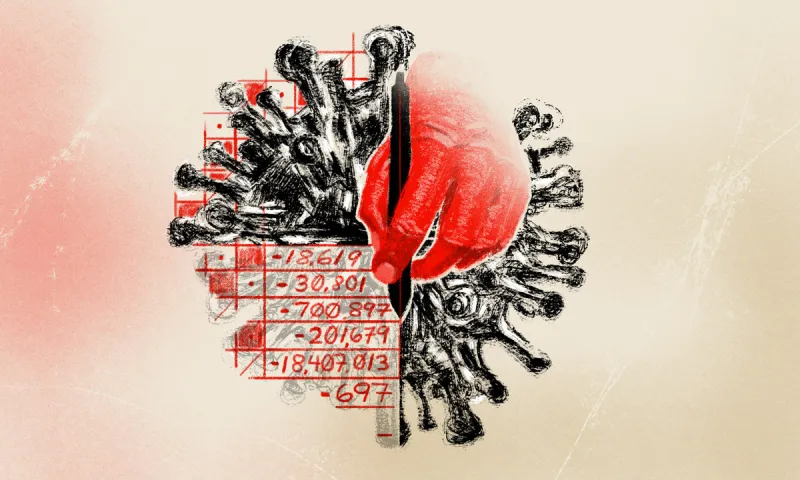
Illustration by Jeremy Leung/II
Relief that Congress gave big banks to help them cope with the effects of the coronavirus pandemic could end up leaving investors in the dark.
Buried in the 880-page coronavirus-relief measure enacted in late March was a provision some banks have sought for more than a year: a delay in a controversial new rule that changes how banks record losses on their soured loans. The new accounting rule, known as Current Expected Credit Losses — or CECL, pronounced “Cecil” — forces them to book all projected future losses on their loans as soon as the loans are issued.
That sounds arcane, but it’s a big deal for the banks — and, some of them argue, a big deal for the economy during a crisis like Covid-19.
With losses booked up front, banks must set aside lots of money in added reserves to meet those losses — especially when the economy looks bad, as it does now. But the banks need that money, they say, to keep making loans and bolster an economy crippled by the pandemic.
Hence the need for a delay in CECL. Otherwise, "volatility will impact bank capital and significantly and adversely impact their ability to lend during a down market," says Michael Gullette, senior vice president for tax and accounting at the American Bankers Association.
But if a delay helps the banks, investor advocates say, it’s not good for investors.
A delay means investors won’t get the kind of up-to-date information CECL was supposed to give them about how much in loan losses a bank could be facing — key for helping an investor determine whether a bank is financially healthy.
In fact, investor advocates say, the pandemic is the very sort of situation the new rule was meant to address — to let investors know whether banks are having any increased difficulty in getting their loans repaid when they’re under severe financial stress. Because of Congress’s delay, that’ll be harder now.
“We’re not going to get the information we need when we need it,” says Barbara Roper, director of investor protection at the Consumer Federation of America. The banks “don’t want information out showing the weaknesses and volatility in [their] capital structure.”
Bank regulators have taken steps separately to relieve CECL’s impact on banks’ capital, and the Securities and Exchange Commission appears to be interpreting the CECL delay in a way that could limit its benefit to banks. Still, it’s the most prominent example thus far of how companies’ financial reporting could be affected by the Covid-19 crisis — and it could foreshadow other reporting effects.
While it may not be the most obvious, or significant, effect of the pandemic, accounting for the coronavirus is on the minds of banks and other companies as they prepare to report their earnings for a quarter in which everything suddenly changed.
Some companies could see disclosures or regulatory filings delayed. Others could see their earnings hit hard because they’re sensitive to accounting rules that come into play when there are big declines in the stock market. Berkshire Hathaway, for instance, could be facing $50 billion-plus in first-quarter investment losses because of an accounting rule, though the company has often said those sorts of losses aren’t representative of its true health.
But much remains unknown about how badly hurt some companies have been by the pandemic. While some, like airlines and cruise-ship operators, obviously stand to take big hits, many others have told shareholders little or nothing about the extent of the virus’s financial impact.
Soon, when first-quarter earnings announcements start, some unpleasant surprises may be awaiting investors.
That sounds uncontroversial — why would you book a loss before it happens? — but in practice it meant banks recorded their losses too slowly when the crisis hit. Ultimately, the banks had to book their losses and set aside reserves in the midst of the crisis, when they could ill afford it. That blindsided investors and contributed to the subsequent credit crunch, CECL advocates say.
So the Financial Accounting Standards Board, which sets accounting rules for U.S. companies, enacted CECL in 2016, requiring banks to book and reserve for all expected future loan losses as soon as the loans are made. Larger banks adopted CECL in January 2020 (smaller banks have until 2023), and many saw big reserve boosts as a result: JPMorgan Chase & Co. added $4.3 billion; Citigroup added $4.1 billion.
The biggest money-center banks haven’t raised much of a fuss about the new rule. But many regional and community banks have been complaining loudly about CECL and pushing for changes since at least 2018 — and in their view, the Covid-19 pandemic is their worst nightmare come true.
Here’s why: After a bank adopts CECL and records that big initial reserve boost, it must update its numbers for expected future losses and reserves each quarter, as it makes new loans and revises projections for losses on existing loans. The key factor in those updates is where it thinks the economy is headed: If it expects a recession, CECL will prompt it to project higher loan losses and boost its reserves.
With the shuttered businesses, layoffs, and other upheavals caused by Covid-19, banks are afraid CECL will force them to sharply increase their projected loan losses and reserves — leaving them with less capital to loan out just when it’s important for them to keep lending.
“CECL is currently restricting our ability to lend to communities in need during these troubled times,” more than 80 bank executives said in a letter to congressional leaders in mid-March, pushing for a delay. They wanted a delay until 2024; ultimately, the relief package gave them the ability to opt out of complying with CECL until the end of 2020 or the end of the government’s pandemic state of emergency, whichever comes first.
The delay is needed because CECL “is going to exacerbate economic stress in a time we can’t allow,” says Missouri Republican Representative Blaine Luetkemeyer, one of the leading opponents of CECL in Congress. “It’s going to make it very difficult for banks to be able to lend, to serve their customers, and do it at an affordable cost.”
Scott Shay, chairman of New York’s Signature Bank and one of the executives who signed the letter to Congress, says it’s virtually impossible for a bank to provide any sort of meaningful projections for investors about loan losses anyway, because so much remains uncertain about just how much havoc the coronavirus will ultimately wreak.
”If you want me to model this, tell me what the Covid deaths will be in three months,” Shay says. ”You can’t predict what’s going to happen in two weeks.”
Supporters of CECL admit the timing is terrible: Nobody expected the new rule to kick in just as a pandemic was upending the economy. “Talk about a stress test,” says Mark Zandi, chief economist at Moody’s Analytics.
But as bad as the coronavirus crisis is, it’s exactly the kind of situation in which the information CECL provides is most important to investors, says Janet Pegg, an analyst at Zion Research Group, an accounting and tax-research firm. With people losing jobs, more may have difficulty repaying loans, so arguably it’s all the more important for investors in the banks to have the best up-to-date information about how the banks’ balance sheets are holding up.
The market is already nervous and uncertain because of the pandemic, and “it’s not helpful that there’s also going to be less information,” the Consumer Federation of America’s Roper says.
If banks do opt out of following CECL during the crisis, investors are still going to ask them what their numbers would look like if CECL were in effect, says Hal Schroeder, a FASB member. "Investors are looking for this kind of information."
Investor advocates also say the banks’ capital concerns are overblown. They note that bank regulators are allowing banks to take up to five years to phase the impact of CECL into their calculations of regulatory capital, so they’re unlikely to become depleted.
Jeff Mahoney, general counsel of the Council of Institutional Investors, says bank lobbyists have “created confusion” in the debate over CECL and its capital impact, and the delay is “unfortunate.”
Supporters of CECL also worry that making the delay optional rather than a blanket delay is going to lead to a patchwork in which some banks follow CECL but others don’t, making it difficult for investors to compare them.
Schroeder thinks only a minority of banks will suspend the rule. Many will continue with it, he thinks, because they’ve already switched over their systems to deal with it, but he fears “a lack of comparability and confusion in the marketplace” between those banks and others that delay.
In addition, if banks take advantage of a deferral, after the emergency is over they will still have to provide their numbers incorporating the new rule back to the start of 2020 anyway — thus limiting the extent to which the deferral will help them. Two big accounting firms, Deloitte & Touche and EY, both recently said the SEC's staff told them that’s how the mechanics will work for banks that defer.
Few companies have provided any details about how their own lending and reserves might be affected by CECL and the pandemic. But American Express Co., which as a credit-card issuer also feels CECL’s impact, said in a March investor presentation that Covid-19 was an “uncertainty” regarding CECL, and that its economic forecasts were “rapidly changing” and “becoming more pessimistic,” which could impact its CECL calculations. A company spokeswoman declined to comment.
For instance, stay-at-home orders and travel restrictions could make it difficult for some companies to finish closing their books for the first quarter or have their auditors audit their results. As of early April, more than 350 companies had indicated they expect regulatory filings to be delayed because of Covid-19, according to Audit Analytics, a consulting firm.
Technology is helping corporate finance officials and auditors do their work even when they can’t travel, and the SEC is giving companies extra time to file disclosure reports. Still, the virus could delay the disclosure of corporate financial information that investors rely upon.
Tim Ryan, U.S. chairman of accounting firm PricewaterhouseCoopers, told reporters in late March that PwC’s auditors were working remotely on audits and “thus far we don’t see financial reporting delays as a big risk.” But the first-quarter earnings-reporting season will be “very challenging,” he said.
Another potential impact: The steep stock-market decline triggered by the pandemic could mean massive bottom-line losses for some companies that hold big stakes in other companies, like Berkshire Hathaway, which owns stakes in Apple, Bank of America Corp., Coca-Cola Co., and others.
An accounting rule that took effect in 2018 requires companies to count the market gains and losses in certain equity stakes they hold in other companies as part of their own earnings. During a bull market, their net income benefits dramatically; during a downturn, it gets crushed.
With Berkshire’s large stakes in other companies, it’s more subject to the rule than most.
A back-of-the-envelope calculation suggests Berkshire’s first-quarter investment losses could exceed $50 billion, assuming it continued to hold all the investments in its portfolio through quarter’s end. Bank of America’s stock fell about 40 percent during the quarter; Wells Fargo & Co., another big Berkshire holding, fell 47 percent.
A Berkshire official couldn’t be reached for comment. The company has seen big quarterly investment gains and losses in the past because of the rule, and Berkshire chairman Warren Buffett has often criticized the rule as misleading. He says investors should ignore the investing losses or gains and focus on Berkshire’s operating earnings.
Covid-19 and the market plunge could also prompt some companies to record big charges against earnings to write down their goodwill, the intangible asset that arises from mergers and acquisitions.
When one company buys another for more than the net worth of its tangible assets, like real estate and equipment, it adds goodwill to its balance sheet to represent the difference. Some companies carry tens of billions of dollars in goodwill, but they have to test the goodwill periodically to see if the value attached to it can still be justified. If not, companies may take an impairment charge to reduce its value, which cuts into their earnings.
If a company’s stock price plunges, especially if it’s trading below its book value, that can be a red flag that a goodwill write-down might be needed — it suggests the market doesn’t believe the company is worth as much as its balance sheet says. A company with a $10 billion market value, trading below book value, might find it tough to justify carrying $30 billion in goodwill.
One company that could see a goodwill write-down: CenturyLink, which has a market value of about $11.6 billion, below its book value of $13.5 billion and compared to its goodwill of $21.5 billion. The company has taken goodwill write-downs each of the last two years and has warned in its regulatory filings that there could be additional write-downs. A company spokesman declined to comment.
Other accounting impacts could lie in wait. SEC chairman Jay Clayton and William Hinman, the commission's corporation-finance director, have urged companies to tell investors as much as possible about the pandemic's effects on their businesses and how they plan to address them, including whether they need and plan to seek federal bailout funds. Investors are "thirsting to know" where companies stand, they said Wednesday.
And if filings are delayed, investors might not find out about some critical information from companies for a while.
With everyone so focused on the virus, notes Zion Research Group’s Pegg, any company that wants to blame business woes on the pandemic will have little trouble doing so, even if its problems are unrelated. “It could be a good time to take a big bath.”





